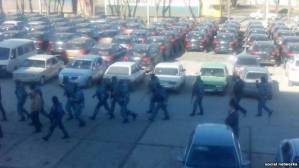CPJ: In Crimea, press freedom deteriorates at a rapid pace
 Armed search of Crimean Tatar TV ATR in Jan 2015
Armed search of Crimean Tatar TV ATR in Jan 2015
The Committee to Protect Journalists has also expressed concern over the deteriorating situation with freedom of the press in Crimea since Russia’s annexation and calls on Vladimir Putin to ensure that it is reversed
April 29, 2015
His Excellency Vladimir Putin
President of the Russian Federation
The Kremlin
Moscow, Russia
Dear President Putin,
The Committee to Protect Journalists, an independent nonprofit organization that promotes press freedom worldwide, is writing to express its concern about the deteriorating climate for press freedom in Crimea.
CPJ research shows that attacks on the press in Crimea have increased following Russia’s annexation of the region in March 2014. Local and international journalists covering the crisis have been harassed, attacked, detained, interrogated, and had their equipment seized. Several news outlets and journalists have also been forced to flee Crimea for different parts of Ukraine since March 2014, according to research by CPJ and the Kiev-based press freedom group Institute of Mass Information and news reports.
Agents with Russian security services, including the FSB and the counter-extremism department of Russia’s interior ministry, have also silenced critical voices in Crimea. Officers from both agencies have seized press equipment and conducted raids on journalists’ homes and independent newsrooms, according to CPJ research and regional media.
Regional authorities have ordered several Ukrainian and Crimean broadcasters off the air, CPJ research shows. Last month, Sergey Aksyonov, the Russia-appointed prime minister of Crimea, stated that Ukrainian broadcasters would not be permitted to resume working in Crimea. News outlets that continued to broadcast faced increasing restrictions by the Russian state media regulator Roskomnadzor.
In September, Aleksandr Zharov, head of Roskomnadzor, said that the 3, 121 news outlets registered in the region under Ukrainian law had to re-register as Russian entities by January 1, according to news reports. The deadline was later extended to April 1. By then, only 8 percent--or 232--of the outlets had obtained registration from Roskomnadzor, the agency said. Under Russian media law, news outlets that produce content without obtaining registration from Roskomnadzor may be subject to prosecution under criminal or administrative laws, or face other sanctions.
Some news outlets affiliated with the ethnic Crimean Tatar minority, including the independent regional broadcaster ATR which produces content in the Crimean Tatar language, have reported that their registration has been denied or left without review. Of the 13 news outlets affiliated with Crimean Tatars that were operational prior to Crimea’s annexation, only three--a children’s magazine, a state-owned broadcaster, and a municipal newspaper--have been granted registration, reports said.
As a result of Roskomnadzor’s actions, many news outlets have been forced to suspend their work in the region, according to regional and international press. Staff members at ATR told CPJ they had filed a fifth application for registration to Roskomnadzor and were waiting for a response. The previous four applications filed by ATR have been left without review.
Roskomnadzor cited privacy laws and did not provide specific reasons to CPJ for denying registration to the news outlets.
Violations against the press in Crimea have been extensively documented by members of the Council on Civil Society and Human Rights, an advisory board under your administration; by Russian and international media; by Ukrainian andinternational human rights groups; by the office of the freedom of the media representative at the Vienna-based Organization for Security and Cooperation in Europe; by the office of the human rights commissioner at the Strasbourg-based Council of Europe; and others. As a result of these countless abuses, regional residents and the international public have been left with inadequate access to alternative news about regional and international developments. Critical journalism seems to be on the brink of extinction.
Mr. President, freedom of the press has worsened in Crimea since the Russian annexation, a trend that should be reversed. All journalists and news outlets must be able to report the news free of harassment and pressure, and security services should cease their intimidation of the press. Further, Roskomnadzor should grant registration to all news outlets, including Crimean Tatar companies, seeking to broadcast in the region. We believe that this situation should be of concern, and we ask that you take immediate action.
Sincerely,
Joel Simon
Executive Director
CC List:
Sergey I. Kislyak, Ambassador of the Russian Federation to the U.S.
John F. Tefft, U.S. Ambassador to the Russian Federation
Olexander Motsyk, Ambassador of Ukraine to the U.S.
Geoffrey R. Pyatt, U.S. Ambassador to Ukraine
Aleksandr Zharov, Head of Roskomnadzor
Dunja Mijatovic, OSCE Freedom of the Media Representative
Nils Muiznieks, Commissioner for Human Rights, Council of Europe
Anne Brasseur, President of the Parliamentary Assembly of the Council of Europe
Guy Berger, Director, Division of Freedom of Expression and Media Development, UNESCO
Thorbjørn Jagland, Secretary General of the Council of Europe
https://cpj.org/2015/04/in-crimea-press-freedom-deteriorates-at-a-rapid-pa.php





